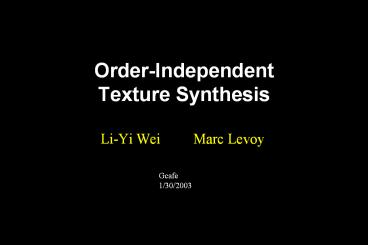Order-Independent Texture Synthesis - PowerPoint PPT Presentation
1 / 42
Title:
Order-Independent Texture Synthesis
Description:
Title: The Design of a Parallel Graphics Interface Last modified by: Li-Yi Wei Created Date: 9/30/1996 6:28:10 PM Document presentation format: 35mm Slides – PowerPoint PPT presentation
Number of Views:57
Avg rating:3.0/5.0
Title: Order-Independent Texture Synthesis
1
Order-Independent Texture Synthesis
- Li-Yi Wei Marc Levoy
Gcafe 1/30/2003
2
Previous Work
- Statistical Synthesis
- general, requires only a sample
- cannot be evaluated randomly on the fly
- Procedural Synthesis
- evaluation on the fly (e.g. Perlin noise)
- efficient
- less general, hard to set parameters
3
Goal
- Combine Advantages from both Camps
- general as statistical methods
- generate new textures from a given example
- flexible as procedural methods
- evaluate texels on demand
- result always identical regardless of evaluation
order
4
New Algorithm
- Key Ideas
- multiple generations
- neighborhood contains only old values
- lower generations, lower resolutions
- pyramidal cache
- Details
- see the paper (4 pages only)?
5
Example
Generation 2
Generation 1
Generation 0
6
Example
7
Single Polygon
19 requested 23 computed
Rendering
Mipmap Texture
8
Quake
Texture 64 ? 64 Unnatural repetition
Texture 512 ? 512 Less repetition
9
Ray Casting
Scene
Texture
10
Simulation Result
11
Future Work
- Implementation as fragment shader?
12
End
13
(No Transcript)
14
Overview
- Procedurally Statistical Texture Synthesis
- algorithm
- architecture
- Applications
- procedural shader
- interactive tools
- texture mapping hardware
15
Texture Mapping
- Bottleneck in graphics pipeline
- computation
- texture memory access
- Solutions
- caching
- pre-fetching
- compression VQ
texture
image
16
Texture Synthesis
Texture Synthesis
Input
Result
17
How It Works
noise
18
Goal
- Combine advantages from both camps
- general
- independent texel evaluation
19
Order-Independent Texture Synthesis
- Simple modifications of our old algorithm
- evaluate pixel in any order
- consistent result (given the same initial value)
- time complexity depends only on neighborhood size
(not on output texture size) - interface much like procedural synthesis
- greater flexibility
- more computation
20
Problem with Old Algorithm
dependency graph
level row col 0 -1 0 0 1 0
0 0 -1 0 0 1 -1
0 0
cycles in the dependency graph!
21
New Algorithm
dependency graph
Keep multiple generations Acyclic dependency graph
level row col generation 0 -1 0 -1
0 1 0 -1 0 0 -1 -1 0
0 1 -1 -1 0 0 newest
22
Implementation Cache
- no full pyramid required, use cache instead
- output determined solely by lowest resolution
23
Algorithm
evaluate (levelL, row x, col y, generation
g)
1. If in cache, return it
2. Collect neighborhood
level row col generation L x-1 y
g-1 L x1 y g-1 L x y-1
g-1 L x y1 g-1 L-1 x y g
Cached?
evaluate (L, x-1, y, g-1)
3. Find best match
24
Cache Footprint Single Pixel
25
Cache Footprint S
26
Cache Footprint Sphere
27
Cache Footprint Random
28
Cache Footprint Single Pixel
1148 pixels!
29
Cache FootprintPoisson Points
30
Cache FootprintCircular Pattern
31
Cache Usage Statistics
random
sphere
Percentage of cache used
ideal (linear)
Percentage of input requested
32
Cache Coherence
33
Quality Comparison
old
new
34
Quake
44 requested 48 computed
Input
Texture 64 ? 64
Texture 512 ? 512
35
QuickTime VR
invisible
Input
Original
Result
36
Simulation Result
37
Architecture Design
38
Pitfalls
- not feasible for current hardware
- can only be applied to repeating patterns
39
Finished Work
- Verification using an infinite cache
40
Ongoing Work
- Measuring and understanding various parameters
- cache size, associativity, replacement policy
- evaluation order for missing pixels (register
allocation) - benchmarking
- Combination with patch-based texture synthesis
- patch boundaries?
- complicate caching behavior
41
(No Transcript)
42
Motivation
- Texture mapping is important
- Texture mapping can be a bottleneck
- Solution Texture Mapping by Synthesis
43
Hardware Trend
- ? Computation gtgt ? Memory Speed
- Transform memory access into computation































